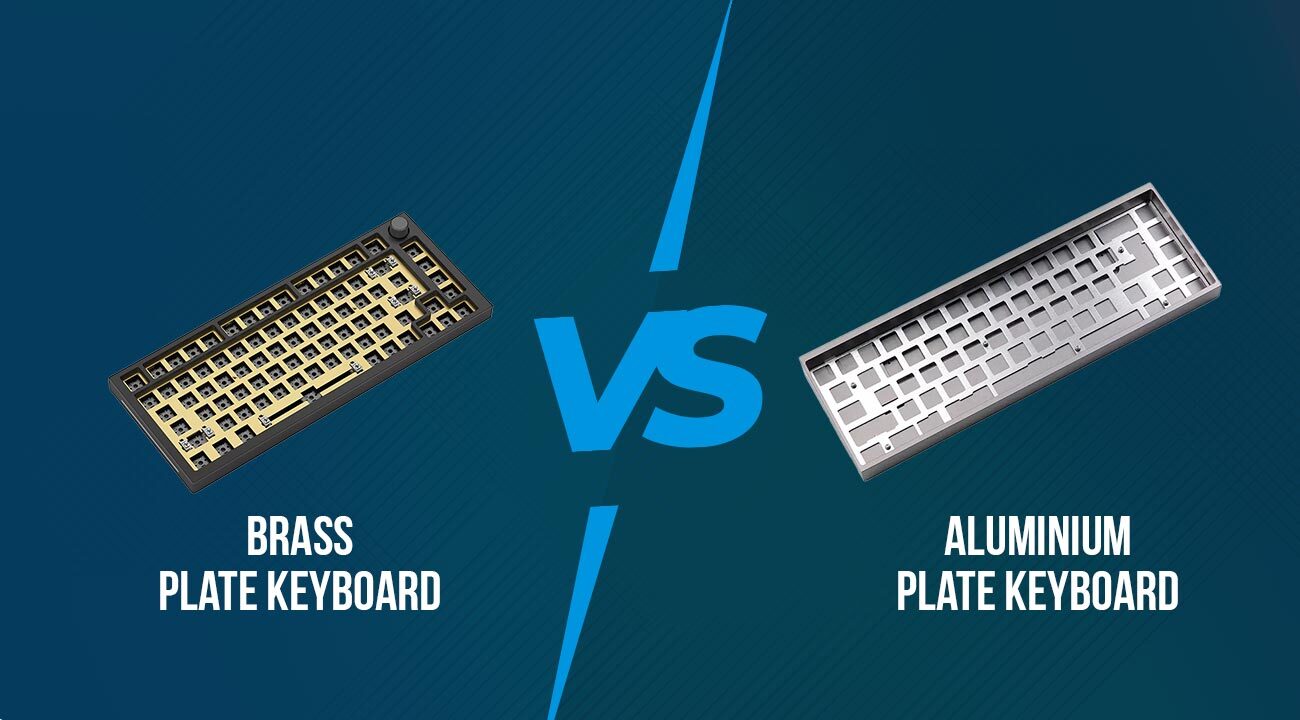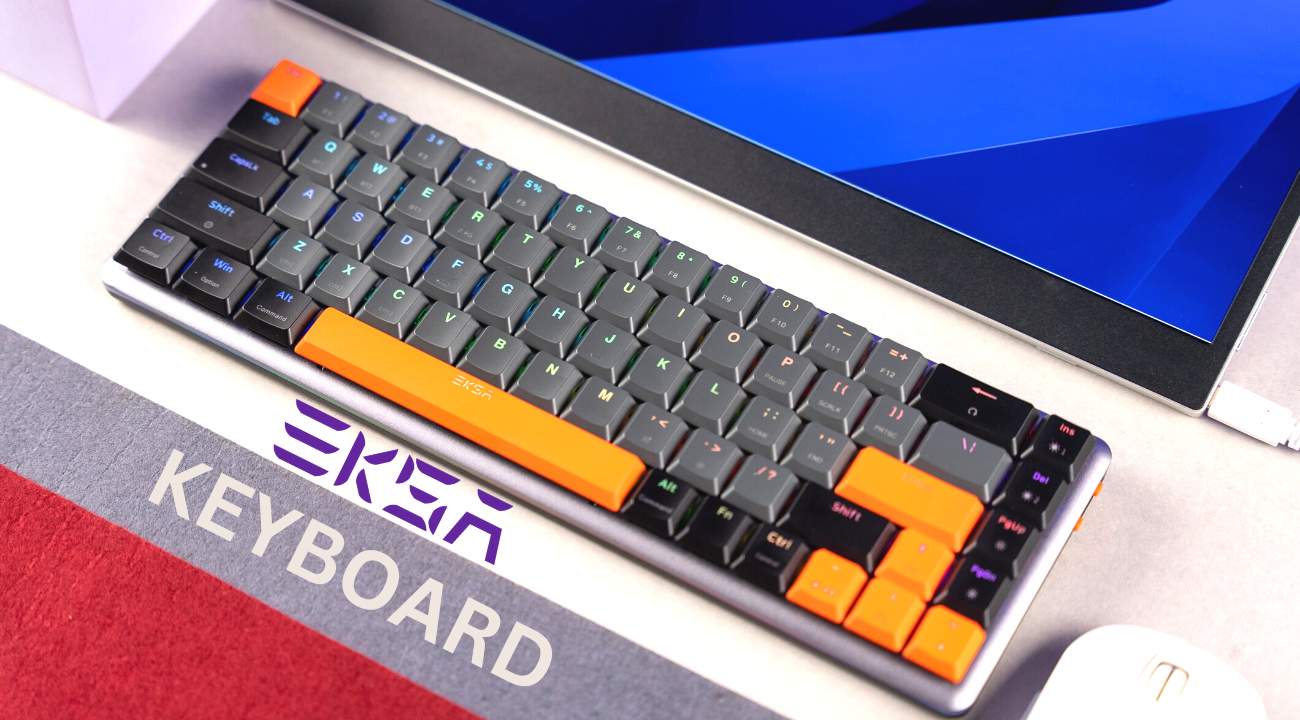Brass and aluminum plate keyboards are among the most popular keyboards in the market. Choosing between the two ultimately depends on personal preference and the kind of typing experience you want. Brass offers a warmer, heavier feel while aluminum provides a cooler, lighter feel with a sleeker look. In this article, we are going to find out which can be a good option for you.
| Brass Plate Keyboard | Aluminium Plate Keyboard | |
| Metal | Brass | Aluminium |
| Material Density | Denser than Aluminium | Lighter than Brass |
| Durability | Durable | Durable |
| Strength | Stronger than aluminum | Less strong than brass |
| Weight | Heavy | Lightweight |
| Cost | Expensive | Comparatively cheaper |
What Is A Keyboard Plate?
A keyboard plate is a structural component of a mechanical keyboard. It serves as the base for the keys, switches, and PCB (printed circuit board), while also helping to reinforce the structure of the keyboard. The plate is typically made of metal, such as aluminum or steel, and can have a significant impact on the overall feel and stability of a keyboard.
The plate can also influence the sound and acoustics of the keyboard, as it can amplify or dampen the sound of the switches. Different materials and thicknesses of plates can produce different sounds, so users often consider the plate when choosing a keyboard for a specific typing or gaming experience.
The keyboard plate is an important aspect of a mechanical keyboard and is often a point of customization for enthusiasts and DIY builders. Different plates can be swapped out to change the look and feel of a keyboard, or to modify the acoustics.

Why does the Keyboard Plate Matter?
The keyboard plate is an important component of a mechanical keyboard as it provides structural support for the keys and switches. The plate contributes to the overall stability and rigidity of the keyboard, making it feel more reinforced and secure. This is particularly important for larger keyboards that tend to flex more due to their size, as the plate helps to keep everything better secured.
Having a strong and stable keyboard can make a big difference in terms of typing experience. The keyboard will be less likely to move around on the desk, and the keys will feel more secure and stable when typing. This can lead to fewer typos, as well as a more enjoyable and satisfying typing experience.
The keyboard plate can also contribute to the acoustics of the keyboard. Different materials have different acoustic properties, which can result in different sounds when typing. Some users prefer the sound of a brass plate, while others prefer the sound of an aluminum plate. The choice of plate material can therefore play a role in the overall typing experience.
However, the keyboard plate is not the only factor that affects typing quality. Other factors such as switches, keycaps, and software can also play a role. That being said, a well-made keyboard plate can make a noticeable difference in terms of the keyboard’s stability and overall typing quality.
The keyboard plate does matter as it provides structural support and stability to the keyboard, and can contribute to the overall typing experience. While it is not the only factor that affects typing quality, a well-made keyboard plate can make a noticeable difference in terms of the keyboard’s stability and overall typing quality.
Brass Keyboard Plate
A brass keyboard plate is a metal plate used in some mechanical keyboards as the structural base for the keys and switches. Brass is a metal alloy composed of copper and zinc, and it is known for its warm, heavy feel. This makes it a popular choice for keyboard enthusiasts who want a satisfying typing experience.
Let’s have a look at the pros and cons of Brass Keyboard plates-
Pros of Brass Keyboard Plate
- With their premium appearance and feel, brass keyboard plates can give your keyboard an opulent appearance.
- Brass is a strong and durable metal that can survive a lot of wear and tear.
Cons of Brass Keyboard Plate
- Compared to some of the others materials, like aluminum, brass is more expensive.
- A brass plate is heavy because brass weighs more than other metals.
- Brass will need to be cleaned frequently to keep it looking its best because it can oxidize with time.

Aluminium Keyboard Plate
An aluminum keyboard plate is a metal plate used in some mechanical keyboards as the structural base for the keys and switches. Aluminum is a lightweight and durable metal that is known for its cool, sleek feel. This makes it a popular choice for users who want a lightweight keyboard with a modern look.
However, the Aluminium keyboard plate has some pros and cons-
Pros of Aluminium Keyboard Plate
- Aluminum is a strong and sturdy material, making aluminum plate keyboards highly resistant to wear and tear.
- The light weight of the aluminum also makes the keyboard more portable.
- The metal surface of the plate can amplify the sound of the switches, making it louder and more satisfying to type on.
- Aluminum is excellent for dissipating heat since it has a very high thermal conductivity. This is especially crucial if you’re employing powerful LEDs or other heat-generating components.
Cons of Aluminium Keyboard Plate
- It’s also a very conductive material, so you need to be extra careful not to short-circuit any of the components on your keyboard.
- Some users find the sound of an aluminum keyboard bothersome.

Which Keyboard Plate Is Better?
Choosing between a brass and aluminum plate keyboard is a matter of personal preference, as both have their own advantages and disadvantages.
Durability:
Brass is a very strong and sturdy material, making brass plate keyboards highly resistant to wear and tear.
The aluminum plate helps to reinforce the structure of the keyboard, making it more durable and resistant to wear and tear.
Improved Typing Experience:
Brass plate keyboards can offer a more solid typing experience compared to plastic or aluminum plate keyboards, as the brass plate provides more stability and rigidity.
The solidity and rigidity of an aluminum plate keyboard can result in a more solid typing experience compared to plastic plate keyboards.
Aesthetic Appeal:
Brass has a distinctive golden color that can add a touch of luxury to your keyboard. This can enhance the overall aesthetic appeal of your setup.
Aluminum has a distinctive silver color that can add a touch of modernity to your keyboard. This can enhance the overall aesthetic appeal of your setup.
Corrosion Resistance:
Brass is a non-ferrous metal, which means it does not rust or corrode. This makes brass plate keyboards suitable for use in environments where the keyboard may be exposed to moisture or other corrosive elements.
Aluminum is a non-ferrous metal, which means it does not rust or corrode. This makes aluminum plate keyboards suitable for use in environments where the keyboard may be exposed to moisture or other corrosive elements.
Improved Sound Quality:
The solidity and rigidity of a brass plate keyboard can result in a more pronounced and satisfying clicking sound when typing.
In addition to its durability and portability, the aluminum plate also contributes to the sound of the keyboard. The metal surface of the plate can amplify the sound of the switches, making it louder and more satisfying to type on. Some users prefer the sound of an aluminum plate, as it can provide a more distinctive typing experience.
Convenience:
Keyboard plates made of brass are often heavier than those made of aluminum. This means it can be heavier to carry.
Therefore, aluminum is more likely to slide and move while being used. Due to their reduced weight, aluminum keyboard plates provide more stability and are less likely to move.
Cost:
Since brass is a more expensive material, brass plate keyboards are costlier. On the other hand, aluminum keyboards are cheaper compared to that.
Which Keyboard Should You Choose?
- Brass vs Aluminum Plate Keyboard: Which One Is Better?
“The short answer is – For better durability, an Aluminium keyboard is a better option. For people who fancy aestheticism, the brass plate keyboard can be their best choice. Ultimately, the choice between a brass or aluminum plate keyboard comes down to the type of typing experience you want and how the keyboard will fit into your overall desktop setup. Both materials have their own unique feel and look, and users should try both out to see which one they prefer.”
FAQ
Are Brass or Aluminum Better for Linear switches?
Both brass and aluminum can be suitable for linear switches, as they provide the stability and rigidity needed for a smooth and consistent typing experience. However, some people prefer brass for its solid typing experience and distinctive aesthetic, while others prefer aluminum for its lightweight and corrosion-resistant properties. Ultimately, the best choice depends on individual preferences and needs.
Do Brass Keyboard Plates Oxidize?
Brass can oxidize over time, causing a natural patina to form on the surface of the plate. This can result in yellow or green discoloration and can affect the appearance of the keyboard. However, some people may prefer the natural aging process of brass, as it can add character and uniqueness to the keyboard.
Prevent Brass Keyboard Plate From Oxidation?
To prevent oxidation of brass keyboard plates, it is recommended to keep the plate clean and dry and to store it in a cool, dry place when not in use. Applying a clear coat of lacquer or wax to the surface of the plate can also help to protect it from moisture and other elements that can cause oxidation. Additionally, wiping the plate regularly with a soft cloth can help to prevent the buildup of dirt and grime, which can contribute to oxidation.
Which is stronger brass or Aluminum for keyboard Plates?
Brass and aluminum are both strong materials, and both can be suitable for keyboard plates. However, brass is typically denser and stronger than aluminum, making it a more solid and sturdy material for keyboard plates.









